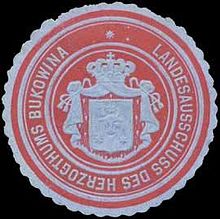Bucovinian Parliament

The Bukovinian Landtag was the Landtag of the Crown Land, Duchy of Bukovina in the Empire of Austria and Austria-Hungary between 1861 and 1918.
The Landtag comprised 30 members, 29 of whom were elected for six years, and the Orthodox Bishop of Bukovina, who was represented in the Landtag with a virile vote . Of the 29 elected representatives, 10 were from the I. Curia of the large landowners, 7 were from the II. Curia of the Cities and the Chamber of Commerce and Industry of Chernivtsi and 12 were from the III. Curia of the Rural Parishes. In 1875 the rector of the University of Czernowitz also received a virile vote in the Bukovinian state parliament, so that the number of state parliament members rose to 31.
After the national equalization in 1910, the number of members of the state parliament was increased to 63 members. In addition to the two virile votes of the Orthodox bishop and the rector of the university, 13 seats were allocated to the large estates, 2 seats to the Chamber of Commerce, 28 members of the urban and rural communities and 18 members of the newly introduced general electoral class.
literature
- Mihai-Ştefan Ceauşu: The state parliament of Bukovina. Constitution and Parliamentarism. In: Adam Wandruszka , Peter Urbanitsch (ed.): The Habsburg Monarchy 1848–1918. Volume 7: Helmut Rumpler , Peter Urbanitsch (eds.): Constitution and parliamentarism. Volume 2: The regional representative bodies. Publishing house of the Austrian Academy of Sciences, Vienna 2000, ISBN 3-7001-2871-1 , pp. 2171-2198.
- Regional and regional election regulations for the Duchy of Bukovina, online